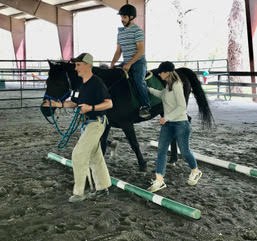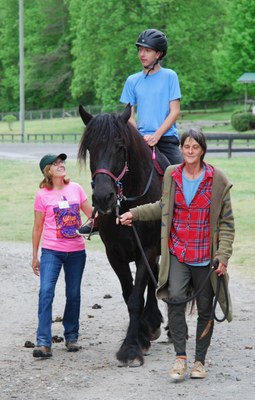About the Program
FENCE is proud to offer TROT, Therapeutic Riding of Tryon, a program that provides equine assisted activities to adults and children with physical, developmental and cognitive disabilities in a safe, friendly and supportive environment.

As a Premier Accredited Center of the Professional Association of Therapeutic Horsemanship International, TROT follows the strict standards set by PATH Intl. for safety and effective teaching. The program is open to residents of Polk, Henderson and Rutherford counties in North Carolina, and Spartanburg and Greenville counties in South Carolina.
 TROT classes are planned and taught by PATH Intl. certified instructors and are built around the individual requirements of each student. In TROT’s mounted program, typically, three volunteers - one to lead the horse, and two to serve as sidewalkers - assist each student to carry out the teacher's instructions. Depending on the needs of each student, mounted classes include exercises and games designed to promote balance, strength and coordination, and develop cognitive skills such as focusing, sequencing, and understanding and following directions. Many lessons take place only at the walk; more advanced students may work for brief periods at the trot.
TROT classes are planned and taught by PATH Intl. certified instructors and are built around the individual requirements of each student. In TROT’s mounted program, typically, three volunteers - one to lead the horse, and two to serve as sidewalkers - assist each student to carry out the teacher's instructions. Depending on the needs of each student, mounted classes include exercises and games designed to promote balance, strength and coordination, and develop cognitive skills such as focusing, sequencing, and understanding and following directions. Many lessons take place only at the walk; more advanced students may work for brief periods at the trot.
Mounted classes are typically a half-hour in length, and may include up to three students. Each student spends hands-on time with the horse before each class grooming and learning how to saddle the horse; after each lesson, students help remove the saddle, clean their horses and offer treats. Students are assisted and supported at all times by volunteers who have completed training courses following PATH Intl. guidelines.
In addition to therapeutic riding, TROT also offers an unmounted therapeutic program to individuals who, because of their disability, cannot sit astride a horse.
Unmounted equine assisted therapeutic activities afford students the opportunity to experience the benefits of interaction with horses. Physical activities include grooming and leading the horses; cognitive and emotional activities include touching and caring for the horses, learning how horses communicate and relating the horse’s behavior to human behavior; and developmental activities include learning to follow directions for a variety of activities, sequencing, and learning about horses and basic horsemanship.
In addition to hands-on time with horses, students in the program participate in games and crafts activities and are treated to demonstrations by equine professionals. Unmounted lessons typically last one hour.
 Inquire about lesson fees and our scholarship fund.
Inquire about lesson fees and our scholarship fund.
Applying For The Program



